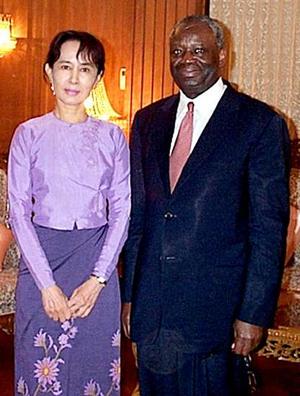Small concession from Burmese junta
Suu Kyi welcomes UN support during rare meeting
Connie Levett Herald Correspondent in Bangkok and agencies
November 13, 2006

Pale but in good health … Aung San Suu Kyi during her meeting with Ibrahim Gambari.
Photo: AFP
THE BURMESE junta has bowed just a little to international pressure, briefly allowing the democracy advocate Aung San Suu Kyi to meet a United Nations envoy in an attempt to head off a new Security Council debate on the oppressive military regime.
The filmed meeting in Rangoon provides what are thought to be the first photos of Suu Kyi, appearing pale but in reasonable health, since early 2003. Many accuse the Burmese junta of having a deaf ear on democracy, but it was undoubtedly listening hard when Ms Suu Kyi met the UN special envoy Ibrahim Gambari on Saturday.
The meeting at a government guest house will have been bugged by the paranoid regime, which is terrified of the power Ms Suu Kyi, or The Lady as she is known to many, continues to hold over the hearts of the Burmese people.
"Notwithstanding the fact that she remains under detention, Ms Suu Kyi conveyed to Gambari that she is in good health but requires more regular medical visits," the UN's Burma office said in a statement released after the one-hour meeting.
"She said also that she welcomes continued engagement by the United Nations [and] hopes that it can be of help in addressing the many issues that have been raised by Gambari."
Ms Suu Kyi, daughter of Burma's founding father, General Aung San, is leader of the National League for Democracy, which won elections in 1990. The military refused to accept the result and she has been in detention for about 10 of the past 17 years.
It is Professor Gambari's second visit to Ms Suu Kyi this year. In May, he became the first foreigner to see her in more than two years. However, talk of a breakthrough on her release was quickly quashed when, a week later, the junta extended her house arrest for another year.
Professor Gambari also met the military head of state, Than Shwe, in the new capital, Naypyitaw, to discuss humanitarian aid and the release of political prisoners, of whom there are thought to be more than 1000.
The US has labelled Burma an "outpost of tyranny" and wants a Security Council resolution. The Burmese generals are experts at making small concessions to temper debate, such as the reconvening last month of the constitution-drafting National Convention, which many consider a sham.
A more significant event may be the recent re-arrest and continuing detention of a prominent activist, Min Ko Naing, one of the leaders of a national uprising in 1988 and seen by many as Ms Suu Kyi's heir apparent.
To read the original article from the Sydney Morning Herald, click on:
SMH
Connie Levett Herald Correspondent in Bangkok and agencies
November 13, 2006

Pale but in good health … Aung San Suu Kyi during her meeting with Ibrahim Gambari.
Photo: AFP
THE BURMESE junta has bowed just a little to international pressure, briefly allowing the democracy advocate Aung San Suu Kyi to meet a United Nations envoy in an attempt to head off a new Security Council debate on the oppressive military regime.
The filmed meeting in Rangoon provides what are thought to be the first photos of Suu Kyi, appearing pale but in reasonable health, since early 2003. Many accuse the Burmese junta of having a deaf ear on democracy, but it was undoubtedly listening hard when Ms Suu Kyi met the UN special envoy Ibrahim Gambari on Saturday.
The meeting at a government guest house will have been bugged by the paranoid regime, which is terrified of the power Ms Suu Kyi, or The Lady as she is known to many, continues to hold over the hearts of the Burmese people.
"Notwithstanding the fact that she remains under detention, Ms Suu Kyi conveyed to Gambari that she is in good health but requires more regular medical visits," the UN's Burma office said in a statement released after the one-hour meeting.
"She said also that she welcomes continued engagement by the United Nations [and] hopes that it can be of help in addressing the many issues that have been raised by Gambari."
Ms Suu Kyi, daughter of Burma's founding father, General Aung San, is leader of the National League for Democracy, which won elections in 1990. The military refused to accept the result and she has been in detention for about 10 of the past 17 years.
It is Professor Gambari's second visit to Ms Suu Kyi this year. In May, he became the first foreigner to see her in more than two years. However, talk of a breakthrough on her release was quickly quashed when, a week later, the junta extended her house arrest for another year.
Professor Gambari also met the military head of state, Than Shwe, in the new capital, Naypyitaw, to discuss humanitarian aid and the release of political prisoners, of whom there are thought to be more than 1000.
The US has labelled Burma an "outpost of tyranny" and wants a Security Council resolution. The Burmese generals are experts at making small concessions to temper debate, such as the reconvening last month of the constitution-drafting National Convention, which many consider a sham.
A more significant event may be the recent re-arrest and continuing detention of a prominent activist, Min Ko Naing, one of the leaders of a national uprising in 1988 and seen by many as Ms Suu Kyi's heir apparent.
To read the original article from the Sydney Morning Herald, click on:
SMH


<< Home